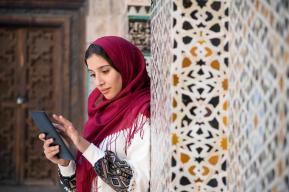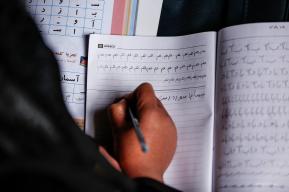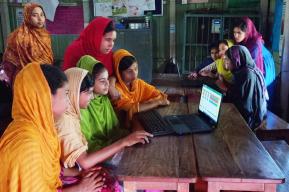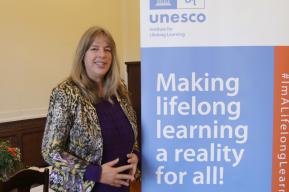News
UNESCO celebrates International Literacy Day and Literacy Prizes 2022 in Côte d’Ivoire

“The COVID-19 crisis has worsened and amplified inequalities. However, education has become a factor for change, as an accelerator in the way in which people learn and teach. This is why this year’s theme is about transforming literacy learning spaces”, these were the words Ms Stefania Giannini, UNESCO Assistant Director-General for Education, expressed to open the 2022 UNESCO International Literacy Conference under the theme, “Transforming literacy learning spaces”. The event was held in a hybrid format in Abidjan, Côte d’Ivoire on 8 and 9 September 2022.
The two-day event mastered by the journalist Naomi Alafé, gathered around 400 participants, including H.E. Ms Dominique Ouattara, First Lady of Côte d’Ivoire, H.E. Ms Mariatou Koné, Minister of National Education and Literacy of Côte d’Ivoire, as well as ministers from Guinea, South Sudan, Burkina Faso, Cambodia and Ecuador. Moreover, it involved the participation of partners, educational experts, educators and learners from around the world.
UNESCO International Literacy Prizes
The UNESCO International Literacy Prizes Ceremony awarded six Laureates of the UNESCO King Sejong and UNESCO Confucius Prizes. This year, the prizes rewarded programmes from India, United Arab Emirates, United Kingdom, Brazil, Malaysia and South Africa. The special session on the prize winners, held on day two, also welcomed Dr Xie Zheping, Chair of the International Literacy Prizes Jury, H.E. Mr Dong Gi Kim, Ambassador of the Permanent Delegation of the Republic of Korea to UNESCO, and H.E. Mr Wan Li, Ambassador of the People’s Republic of China to Côte d’Ivoire.
The two-day conference has been a unique occasion to rethink the role of literacy and the multiple learning spaces in the face of challenges and opportunities in the post-pandemic era. It allowed participants to discuss and share best practices on how to transform current literacy learning spaces and put the needs of the learners at the core of the global education agenda.
Ms Dominique Ouattara, First Lady of Côte d’Ivoire, stated that the International Literacy Day celebrations are, “the ideal framework to share ideas and experiences, as well as to show ways forward so as to accelerate literacy among adults and young people”.
The role of literacy has been highly reiterated throughout the event and its power has also been testified by the story of Ms Gnahore Esther, whose life changed when she learned how to read and write, through the NGO GA-TIC, former Laureate of 2021.
“However, for literacy to continue to act as a factor of change, some challenges must be addressed, and policy recommendations must be enacted”, stated Mr Borhene Chakroun, Director of the Division of Policies and Lifelong Learning Systems at UNESCO. He also reiterated the importance of UNESCO’s commitment in investing its efforts in line with the recommendations of the Transforming Education Summit.
During the ministerial panel, discussions shed light on important global challenges that governments still need to overcome in order to make progress in literacy levels and that allows to renew the political commitment for the advancement of literacy as a fundamental human right around the world. In the words of the Minister of South Sudan, Ms Awut Deng Acuil, “literacy does not have age limits; it’s a power we can give to each and every one, a power that no one can take away”.
Embracing multiple literacy learning spaces
During the event, participants highlighted the need to embrace multiple types of literacy learning spaces in order to better respond to the evolving needs of learners, notably in the aftermath of the COVID-19 crisis. Speakers shared that although the pandemic has disrupted the education system around the world, it has also provided opportunities for improvement and transformation. Mr Li Jiacheng, Deputy Director at Shanghai Municipal Institute for Lifelong Education (SMILE) and Professor at East China Normal University shared that, “it is necessary to renew the understanding of education and of learning. We know that learning happens at anytime and anywhere”. Therefore, panellists stressed that it is crucial to leverage existing learning spaces outside of the formal education channels such as family, community, workplace and digital modes in order to truly cope with the fast-changing education environment and guide its transformation.
“A real transformation of the education system may occur only if it considers the principles of inclusivity and equality”, shared Hervé Huot-Marchand, Chief of the Youth, Literacy and Skills Development Section at UNESCO. It was further enhanced by speakers that it is crucial to create inclusive learning spaces, addressing the needs of women, people with disabilities, refugees, internally displaced people, migrants and indigenous people in order for education to reach the most vulnerable groups and leave no one behind.
Aspects of governance of the literacy learning spaces, in particular informal and non-formal ones, were addressed by participants during the second day of the event, notably in terms of financing, partnerships and monitoring and evaluation of literacy outcomes, both with an international perspective and a specific focus on Africa.
Successful examples of partnerships for capacity building came from Morocco with the development of the National Roadmap for Literacy 2022-26, which aims at eradicating illiteracy in Morocco by 2029. Moreover, the National Fund for Literacy from Burkina Faso has shown the importance of collaborations and partnerships between state and non-state actors to encourage sustainable funding for literacy. In addition, public-private partnerships have been highly recommended, with the relevant example of the big tripartite project between Nestle, Government of Côte d’Ivoire and UNESCO.
Moreover, the challenge of lack of resources and adequate financing systems in education has been particularly highlighted in the discussion, concluding that “governments and development partners must invest more and better in education,” as stated by Mr Jawara Gaye, Lead Education Specialist at Islamic Development Bank.
A special focus was also given to tools and governance of digital literacy and to the necessity for data collection and monitoring and evaluation for a successful implementation of literacy programmes and projects. Mobilization of political engagement were also in the discussions, Mr Abdel Rahamane Baba-Moussa, Secretary General of CONFEMEN, shared “we must consider that children can learn at school but also at other spaces; and we need to create pathways between these different spaces so that they can continue learning the skills that they need”.
In the closing session, Mr Borhene Chakroun highlighted the importance of collaborations and sharing to truly transform literacy learning spaces. He strengthened the necessity to “draw up the link between education systems and literacy”. In addition, Ms Mariatou Koné, stressed the importance of advancing literacy since it “contributes to the social professional integration of marginalized people and enables people to take part in the job market”.






